Dublin - Event Notice
Thursday January 01 1970
The Forgotten Country-Haiti Awareness Evening
 dublin |
rights, freedoms and repression |
event notice
dublin |
rights, freedoms and repression |
event notice
 Wednesday June 11, 2008 01:51
Wednesday June 11, 2008 01:51 by Colette Rooney - Viatores Christi and the Latin American Solidarity Centre
by Colette Rooney - Viatores Christi and the Latin American Solidarity Centre Viatores Christi, 8 New Cabra Road, Phibsboro, Dublin 7.
Viatores Christi, 8 New Cabra Road, Phibsboro, Dublin 7. (01) 8689986
(01) 8689986

An evening organised by Viatores Christi and the Latin American Solidarity Centre to raise awareness about the poorest country in the western world and how you can help by becoming more aware and by volunteering your skills with LASC and Viatores Christi.
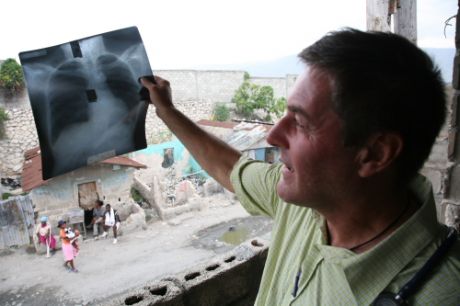
Fr Rick checks examines a chest x-ray in the clinic in the heart of Cité Soleil
Irish Aid Centre, O’Connell St,
Thursday 19th June 2008, 7:30pm - 10pm
A evening organised by Viatores Christi and the Latin American Solidarity Centre
At the end of the 18th Century, Haiti, the “gem of the Caribbean” was among one of the richest countries of the world. During the 17th and 18th centuries, thousands of Africans were kidnapped and brought to Haiti to work as slaves. The former French colony became the first independent black republic in 1804, after a slave rebellion.
Since that time Haitians have struggled to level the playing field in the face of often hostile foreign intervention, occupation, revolutions, civil war and vicious dictatorships. Today Haiti has one of the highest infant mortality rates and an average life expectancy of not quite 50 years.
Most of the population has no access to sanitation and no reliable source of water. Haiti has recently been in the news as rising global food prices drive an already starving population to riot in frustration.
Programme
Introduction
Colette Rooney from Viatores Christi
Pepe Gutiérrez from the Latin American Solidarity Centre, Dublin.
Guest speaker
Peter Hallward, University of Middlesex, author of Damning the Flood: Haiti, Aristide, and the Politics of Containment
Peter Hallward is professor of Modern European Philosophy at Middlesex University. His research ranges across several debates in recent continental philosophy and the reception of post-colonial literature. He also works on some of the obstacles currently facing progressive political movements in several parts of the world.
Damming the Flood is his fourth book and has been widely praised as the first accurate and comprehensive analysis of recent Haitian history as well as an insightful eye into the future of the troubled Caribbean country.
Stories from Haiti
Presentation and slideshow by journalist Nóra Geraghty and photojournalist Paula Geraghty, who visited Haiti in 2007 on behalf of Viatores Christi as part of the IMRS Missionary Development Awareness Scheme. They, with Pat Mollaghan, returned Viatores Christi volunteer, talk about their experience in Haiti and in particular the people they met. This presentation will help give an insight into the reality of life in the Port-au-Prince area. Their presentation will feature images from Cité Soleil, Port au Prince and life in an orphanage in which Viatores Christi volunteers help care for abandoned and orphaned children and the new state-of-the-art hospital, constructed by local Haitians, under the guidance of Pat Mollaghan.
Call to action
How you can help by becoming more aware and by volunteering your skills with LASC and Viatores Christi.
Closing Remarks
For further information, please contact Colette Rooney, Viatores Christi, 8 New Cabra Road, Phibsboro, Dublin 7. Tel. (01) 8689986 colette@viatoreschristi.com
images (c) Paula Geraghty
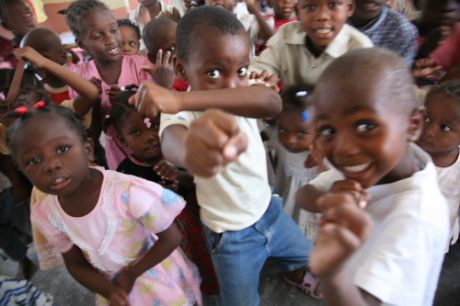
Children from Wharf Jeremie, a slum built on a rubbish dump in Port-au-Prince, at one of the few primary educational facilities available, meals are guaranteed.
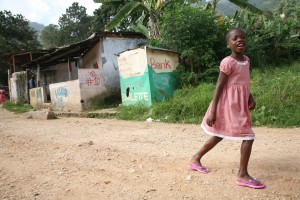
Walking to mass in Kenscoff from 5,500ft up, brightly coloured banks only sell lottery tickets.
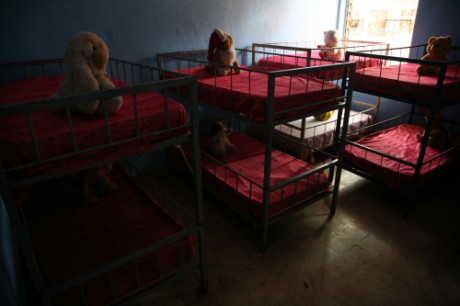
under fives dormitory in an orphanage near Kenscoff
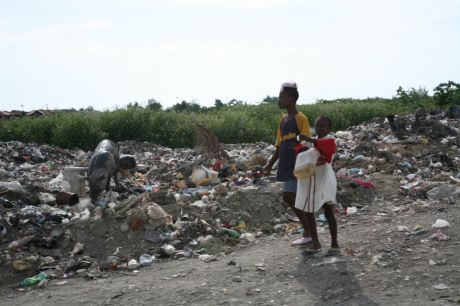
The state does not provide social services. Wild pigs roam and rummage through decaying rubbish dumps
 dublin |
rights, freedoms and repression |
event notice
dublin |
rights, freedoms and repression |
event notice
 Wednesday June 11, 2008 01:51
Wednesday June 11, 2008 01:51 by Colette Rooney - Viatores Christi and the Latin American Solidarity Centre
by Colette Rooney - Viatores Christi and the Latin American Solidarity Centre Viatores Christi, 8 New Cabra Road, Phibsboro, Dublin 7.
Viatores Christi, 8 New Cabra Road, Phibsboro, Dublin 7. (01) 8689986
(01) 8689986




























 printable version
printable version

 Digg this
Digg this del.icio.us
del.icio.us Furl
Furl Reddit
Reddit Technorati
Technorati Facebook
Facebook Gab
Gab Twitter
Twitter
View Comments Titles Only
save preference
Comments (5 of 5)
Jump To Comment: 1 2 3 4 5Ive a Haitian friend here in Barcelona, who can tell you many more tales from this country, but he's back there now for a while, ill pass the link on...
A thing you might find interesting or uplifting..... from democracy now:
AG: “Haiti” by Arcade Fire. They’re a Canadian band who talk about Partners in Health while on tour and donate money from ticket sales. "
PF: "But if you look more closely, at their tours, a dollar of their every American tour went straight to Partners in Health, and a euro of their every European tour. So, yeah, one of our major donors is a rock band. I think it’s pretty cool. "
Dr. Paul Farmer Challenges Profit-Driven Medical System While Bringing Healthcare to Poor Communities Worldwide
"More than twenty year ago, Dr. Farmer co-founded the charity Partners in Health to provide free medical care in central Haiti. Today, Partners In Health provides healthcare for people with HIV/AIDS, tuberculosis, malaria and other conditions in Haiti and eight other countries around the world. We spend the hour with Dr. Farmer on his work, his remarkable background and the challenges of pursuing healthcare with a social justice perspective."
http://www.democracynow.org/2008/5/28/dr_paul_farmer_ch...riven
The PIH Vision: Whatever it takes:
At its root, our mission is both medical and moral. It is based on solidarity, rather than charity alone.
http://www.pih.org/where/Haiti/Haiti.html
Haiti / Zanmi Lasante
"Zanmi Lasante (“Partners In Health” in Haitian Kreyol) is PIH’s flagship project – the oldest, largest, most ambitious, and most replicated. The small community clinic that first started treating patients in the village of Cange in 1985, has grown into the Zanmi Lasante (ZL) Sociomedical Complex, featuring a 104-bed, full-service hospital with two operating rooms, adult and pediatric inpatient wards, an infectious disease center..."
I wish I could be there for the presentations and this discussion. I spent some time with and got to know Fr. Rick Frechette (the doctor in the first image) when I volunteered in Haiti in 2001. He is a priest with Nuestros Pequeños Hermanos/Nos Petits Frères et Soeurs/Our Little Brothers and Sisters, founded by Fr. William Wasson in the 50's. They opened their first orphanage in Haiti in 1988.
This is their website where you can find more info on their work, mission, etc.:
http://www.nph.org/
Haitian volunteers and the orphans themselves are at the heart and soul of this operation and this is what makes it so special.
Fr. Rick helped me get voluntary work in hospices run Brothers/Sisters of Charity when I lived in Port-au-Prince in 2001 and I owe him a great debt for his help and advice. He has visited Ireland on occasions as there have been many independent Irish volunteers who have worked in Haiti as well as those connected to VC, LASC, etc. I is really great that this event is occuring (and well done to organisers/contributors) as Haiti has long being a forgotten land amongst the west, in particular those most responsible for it's exploitation, France and the U.S.
Sr. Helen Ryder, La Sainte Union, and Kieran Rigney are two members of my home community of Banagher, Co Offaly, who have worked in Haiti over the past decade. Kieran used to be director of an orphanage run by Nuestros Pequeños Hermanos but moved to Dominican Republic to help open and run their new operation there. Sr. Helen still works in cites near the airport of Port-au-Prince (aux-Cayes, Jeremie) and in conjunction with the local community do really great work in a very difficult environment.
Despite the fact that I will be absent from this meeting I would be very interested in hearing what folks think of the following ideas, thoughts, etc. This is not intended to be critical of anyone individual, but more a sense of thinking aloud and attempting to work out what could be best practice in depicting the global south, and in this case Haiti, when we as journo's, volunteers, etc. travel abroad.
First of all, when one is promoting any meeting, in this case one about Haiti, I think it's really important to show images which also show the resourcefulness of and how joyful the local people are despite the enormous struggles they face on a daily basis. The first 3 images are ok but the last one has an unfortunate slogan 'Wild pigs........' as he people who are passing by may very well be just on their way home - minimally it should be made clear what role they play in this scene.
All too often we reinforce hand-me-down, stereotypical images of 'powerless', 'nameless', 'voiceless', 'poor folk' - one of the best ways to combat this is taking into consideration the 'Code of Conduct on Images and Messages' which has been devised by Dochas (Irish Development NGO body) and informed by the perspectives and proposals of global south partners:
Homepage: http://www.dochas.ie/code.htm
Guide to the Code: http://www.dochas.ie/documents/Guide_to_Code.pdf
My initial reaction to this guide was that it seemed in some ways to sanitise the truth, which at times is truly bloody awful (famine, genocide, etc). But with time, looking at best practice, seeing some really bad images placed out of context on billboards, posters, in main newspapers, etc. and unfortunately primarily portrayed by NGOs throughout Europe, I began to realise the important essence of the guide, and how it can best serve the main stakeholders, i.e. those being portrayed and/or those we are trying to help.
To have a fair and balanced view of Haitian life one ought to also show tap-tap taxis, the bustling street markets, those involved in the creative arts, the brilliance of the kids who can make a game out of everything and anything and have fun for hours due to their creativity, etc. Obviously one cannot give a complete picture of Haitian life in a few pictures, but I think it is incredibly important to carefully be aware of the message being depicted in the images and messages shown in the media. Does this image fully represent the geographical situation where it was taken? Who are the people who have been photographed and where are they from? Have I got their permission to publish their images in whatever fashion I see fit? Do I know their full names or anything about them or have I even tried o get this information? These are just some of the questions that the 'Code of Conduct', rightfully, in my opinion, suggests we ask ourselves before conveying our experiences to the Global North.
When I look back at the materials I have uploaded on to this and other sites in the past I realise I have a lot to learn myself in terms of best practice on images and messages of the Global South. It is from this position that I jot down these thoughts.
By no means am I trying to propose censorship of reality here - people certainly do feed out of dumpsters, infant and maternal mortality are abysmally high, riots have been occurring on the streets due to food price hikes throughout Haiti amongst other places. My point is merely that certain images, as they stand by themselves, without the proper informed context also being relayed, can do more harm than good and are or may potentially be dehumanising towards those that they show and are probably trying to aid. Images of poverty may not always be 'educational' and as can be read on page 7 of the Code linked above, neither can the other extreme of the 'smiling child'.
These codes of conduct help us all to reflect carefully about what we are portraying and whether more damage than benefits are gained in terms of their relationship with and impact on the public and opinion shapers. As we know, images and messages of any group of people (post-typhoon homeless Bangladeshis, heroin addicts in Dublin city centre), situations (Tiananmen Square '89, cops beating peaceful protestors against Shell in Mayo), have the potential to seriously impact and influence the way society perceive others and their cause. Other examples that come to mind are the torrent of negativity that travellers faced in the aftermath of huge dumping by the River Dodder in 2001/2; worldwide-known incidents like that infamous soccer headbutt by Francs's Zinedine Zidane on Marco Materazzi following relentless racist taunting by the Italian; institutions (political scandals after videos showing bribery - Beata Sawicka in Poland), and so on. No revelations there - images inform us, drive our passions, can often change our lives, toughen or destroy our prejudices.
A recent instance that infuriated my girlfriend (she has been the one open my eyes more and more on this whole issue) and I recently saw a posters here in Warsaw that were supposed to be a charity appeal for Africa, driven we can only hazard a guess by the current food price crisis in many countries. It had an open hand sticking out of an African map - the hand feeding a butt naked, emaciated and crouched over African kid. This type of image and message in my view and more importantly in terms of the Code guidelines, is completely unethical and does nothing to help hungry kids in Africa (in itself, we should always remember, not a monolith, but a continent of 53 countries with 922 million people and over a thousand languages). The additional information in the latter parentheses I deemed worthy of attaching as I am sick to the teeth of people talking about Africa as if it is one mass war zone where refugees and empty stomachs abound.
Surely we know that not all kids in Africa or Haiti are starving, helpless, jobless and too dumb to help themselves?
Well, how would we, when the only images we see, or at least the vast majority of images we see throughout our lives, show them (that is the billions of fellow human beings whose quality of life has been all but wiped out by the Global North policy makers and citizens due to their/our historical role in exploiting them) with their hands reaching out in a begging manner, eyelids covered in flies, stomachs bloated, ravines being used as toilets.......... you get the point I'm trying to make.
A lot of these images and messages are thrown out by the PR departments of big NGO's without any forethought of what it means for those being depicted, that is, the key stakeholders. It feeds directly into the traditional Western-centric model of development (maybe first introduced to us by the church missionaries and their 'poor boxes') that 'we' have the know-how and little mutuality or consultation with grassroots movements or the public in the Global South is thus needed - the concept of partnership was and still is a long way off being fulfilled.
It happens all too frequently nowadays with the Geldofisation/ Bonoisation / Sachs and his cry out for more and more sweatshops, top-down development outreach (the impact of which is more like a punch in the face to social movements in the Global South) - to which grassroots organisations in Africa continue to respond - 'Nothing about us without us':
See Stuart Hodkinson's article: http://www.indymedia.org.uk/en/2005/06/315058.html
Mainstream and alternative media images are guilty of reinforcing negative images of the global south on a daily basis and I myself have in the past been a tool in perpetuating this. Charities tend to go with the sensational cause it's a 'quick sell' to the public who they believe just want some stark and simply awful, emotionally-loaded images to help the ordinary Joe and Josephine to churn out their pocket contents for a worthy cause, be it tsunami, earthquake, famine, refugee crisis, genocide or any other disaster. NGO's and government charity or aid departments are well aware of donor fatigue and have responded by spreading even more shocking stereotypical images when disasters occur. Yes, sometimes the truth must be shown in all it's ugliness (even the Code I have referred to acknowledges this is sometimes impossible to avoid), but the majority of images and messages we receive on a daily basis are quite simply manipulative of the truth, partially the truth, and geared towards guilt-tripping and misinforming the public so they enter charity-raising contests. Preserving the dignity of those depicted and most vulnerable is thrown to the wayside.
I think this topic, if good contrasting images are shown, would be a very interesting debating topic for Indymedia and could prove to be a hot issue for contributors to Indymedia and other political sites.
For good models in terms of how the 'Code Conduct on Images and Messages' is attempted please check the links at the following url:
http://www.dochas.ie/resources05.htm
Best of luck with the meeting tonight. I look forward to catching up with Paula to hear about her experiences.
I agree with some of the above comments and the slide show will have a much more diverse range of images. That's hopefully the purpose of having a Haitian awareness evening.
Sometimes the context in which images are taken are not apparent. Mostly in the work I did in Haiti permission was sought before taking images. That negotiation is part of the process on the non-exploitative of image creation. However one cannot stop and ask everyone their name and often people do not wish to give their name, why should they?
The Dochas Code is a useful one and I think applies more to how organisations use and show images. There was one recently for Newstalk of John O'Shea of Goal in a country not in Europe with blurred out 'poor black people' in the background, promoting Newstalk.
I would consider that to be exploitative. Also I'm wary of being a propagandist for any group or organisation; it reminds me of the Soviet images of the happy collectivised farmers the strong women and the hopeful eyes of the children handing flowers out to dignitaries when the reality was so different. There is a lot of negative imagery but it is difficult to get that positive angle out there, so many editors just don't want to know. I would suggest reading Nick Davies 'Flat Earth News' (reviewed on indymedia.ie by Chekov) and that would help explain some of the pressures why developmental stories and images don't get out there.
I think every photojournalist battles with those ethical questions raised above, but at the end of the day we take images, some are very unpleasant to our western eye but are normal in the lives of others. What we do with the images are very important but our best intentions can go to the wayside as further up the food chain some one else makes the decisions. That image of the two people walking past the open rubbish dump is an everyday reality in Port-au-Prince. That is the simple point of the image. That in itself is quite shocking. I'm sure Damien has many more stories about the wild pigs, I certainly heard some gruesome ones.
We were guests of Viatores Christi, and through their networks we had access to some of the many success stories in Haiti. These include the hospital, the clinics in the slums, the schools and clinics being built. The first centre being built for children with severe physical disabilities. The training of locals to be able to be able to offer care to high professional standards developing a sustainable health program focussing on building local capacity.All this happening in a very tough environment politically, financially and in the face of prejudice.
Do come along to the Haiti Awareness evening from 7-10pm this evening to discuss these and many more issues.
for very interesting and sensible comments Paula. Your work is always of high quality and it is indeed very difficult to ensure he images are used in a non-exploitative way. I hope some news editors attend your awareness evening.
Wanted to greet Sr Helen Ryder, a beloved friend from long ago in Burundi, Petit seminaire Muyinga. Heard she lives and works in Haiti (Jeremie). Strongly willing to hear from her .